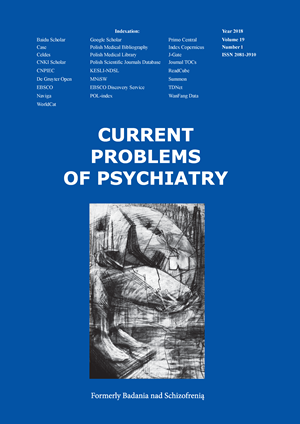Intrapersonal conflicts of bloggers: psychological perspective
DOI:
https://doi.org/10.1515/cpp-2018-0001Keywords:
konflikt, orientacja na wartość, wirtualne ja, blogerAbstract
Aim. The aim of the study was to establish depth and substantive characteristics of intrapersonal conflicts of bloggers. Internal conflicts were analyzed at the levels of individual typological characteristics, self-conception, and value orientation of personality.
Research methodology. The study was based on the method of content analysis and psychodiagnostic tests. 100 respondents (50 respondents who have blogs and 50 respondents who do not have blogs) were examined with Sobczyk’s individual typological questionnaire, Stephenson’s Q sorting, Budassi’s scale of self-assessment, Leary’s interpersonal diagnosis of personality, Fantalova’s value / accessibility correlation in different life spheres. Mann-Whitney test and Spearman’s rank correlation coefficient were applied for statistical data processing.
Research results. The results of the survey support the hypothesis regarding the special character of the intra-personal conflicts of bloggers in comparison with those people who do not have blogs and use the Internet less often. In fact, conflicts between real self and virtual self are characteristic of bloggers. Most of the tension is the result of contradiction of ideas about their personal social and communicative competence and the opposition of coping strategies “acceptance of struggle – avoidance of struggle”.
Conclusions. There are different views on how the Internet influences psychological wellbeing. Social networks allow bloggers to present themselves in a certain desired light, to create some image, to stress their unique features, to attract attention to those character properties which are not manifested in real life as desired.
References
1. Horney K. Our inner conflicts: A constructive theory of neurosis. New York; Norton: 1992.
2. Volokhonskij V. L. Psikhologicheskiie mekhanizmy i osnovaniia klassifikatsii blogov [Psychological mechanisms and the base for blog classification] IN: Volokhonskij V. L., Zajtseva Yu. E., Sokolov M.M. eds. Lichnost i mezhlichnostnoie vzaimodejstvije v seti internet: blogi: novaia realnost [Personality and intrapersonality interaction in the Internet: blogs: new reality]. St. Petersburgh; St. Petersburgh University Press: 2006, p. 117-131. Russian.
3. Kraut R., Patterson M., Lundmark V., Kiesler S., Mukopadhyay T., Scherlis W. Internet paradox: A social technology that reduces social involvement and psychological well-being? Am Psychol. September 1998; 9(53): 1017-1031.
4. Nie N.H., Hillygus D.S. The impact of Internet use on sociability: time-diary findings. IT & Society. 2002; 1(1): 1-20.
5. Tikhomirov O. K. Psykhologiia kompiuterizatsii [Psychology of computerization]. Kyiv; Znaniie: 2013. Russian.
6. Zimbardo P.G., Henderson L. Foreword. IN: Crozier W.R., ed. Shyness: Development, consolidation and change. London & New York; Routledge: 2000, p. xiii-xv.
7. Roberts L.D., Smith L.M., Pollock C.M. ‘u r a lot bolder on the net’: shiness and Inernet use. IN: Crozier W.R., ed. Shyness: Development, consolidation and change. London & New York; Routledge: 2000, p. 121-138.
8. Kriger B. Complete works. Huntsville; Altaspera: 2012.
9. Klajn P. Spravochnoie rukovodstvo po konstruirovaniiu testov [Reference guide on test construction]. Kyiv; PAN Ltd.: 2000. Russian.
10. Belinskaia Ye. P. Lichnost i novaia informatsionnaia sreda [Personality and new information environment]. IN: Belinskaia Ye. P., Tikhomandritskaia O. A., eds. Sotsialnaia psikhologia lichnosti [Social psychology of personality]. Moscow; Aspekt-Press: 2001, 475 p. Russian.
11. Babaeva Yu. D., Vojskunskij A. E., Smyslova O. V. Internet: vozdejstvie na lichnost [Internet: influence on personality]. IN: Vojskunskij A. E., ed., Gumanitarnye issledovaniia v Internete [Humanities research in the Internet]. Mozhajsk; Terra Moskva: 2000, p. 11-39. Russian.
12. Vojskunskij A. E. Psikhologicheskiie aspekty deiatelnosti cheloveka v Internet-srede [Psychological aspects of human activity in the Internet environment]. 2 Rossijskaia konferentsiia po ekologicheskoj psikhologii. Tezisy [Proceedings of 2nd Russian conference on ecological psychology]. Moscow, 12-14 April 2000: 240-245. Russian.
13. Plastina A.F. The language of academic weblogs: How personality is projected and perceived. IN: Scliar-Cabral L., ed. Psycholinguistics: Scientific and technological challenges. Porto Alegre; EDIPUCRS: 2010, p. 350-363.
14. Karelina A.A. ed. Psikhologicheskiie testy [Psychologic tests]. Vol. 2. Moscow; Vlados: 1999. Russian.
15. Fantalova Ye. B. Diagnostika i psikhoterapiia vnutrennego konflikta [Diagnostics and psychoterapy of inner conflict]. Samara; Barakh-M: 2001. 128 р. Russian.
Downloads
Published
Issue
Section
License
Copyright (c) 2018 Author

This work is licensed under a Creative Commons Attribution-NonCommercial-NoDerivatives 3.0 Unported License.


